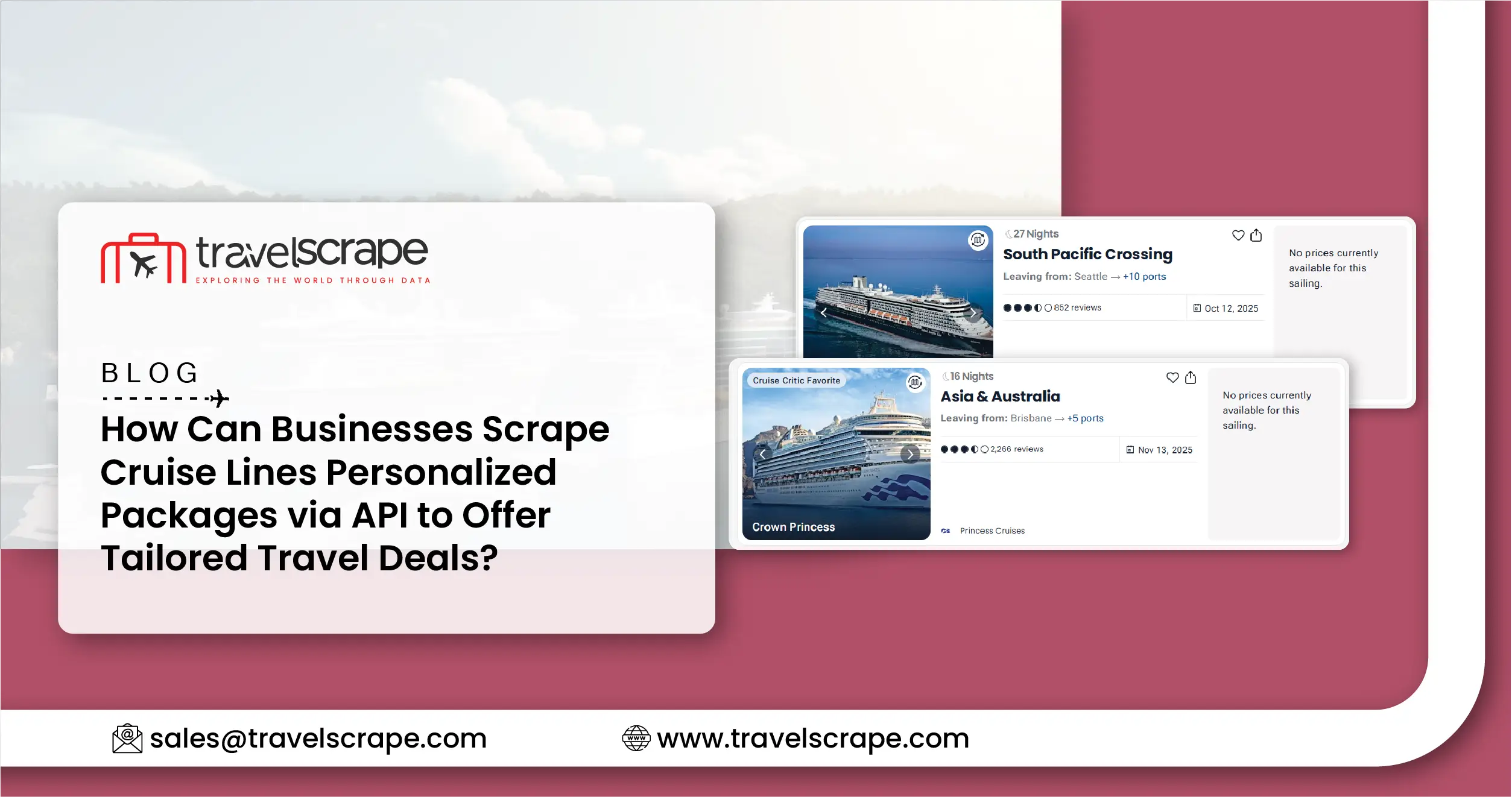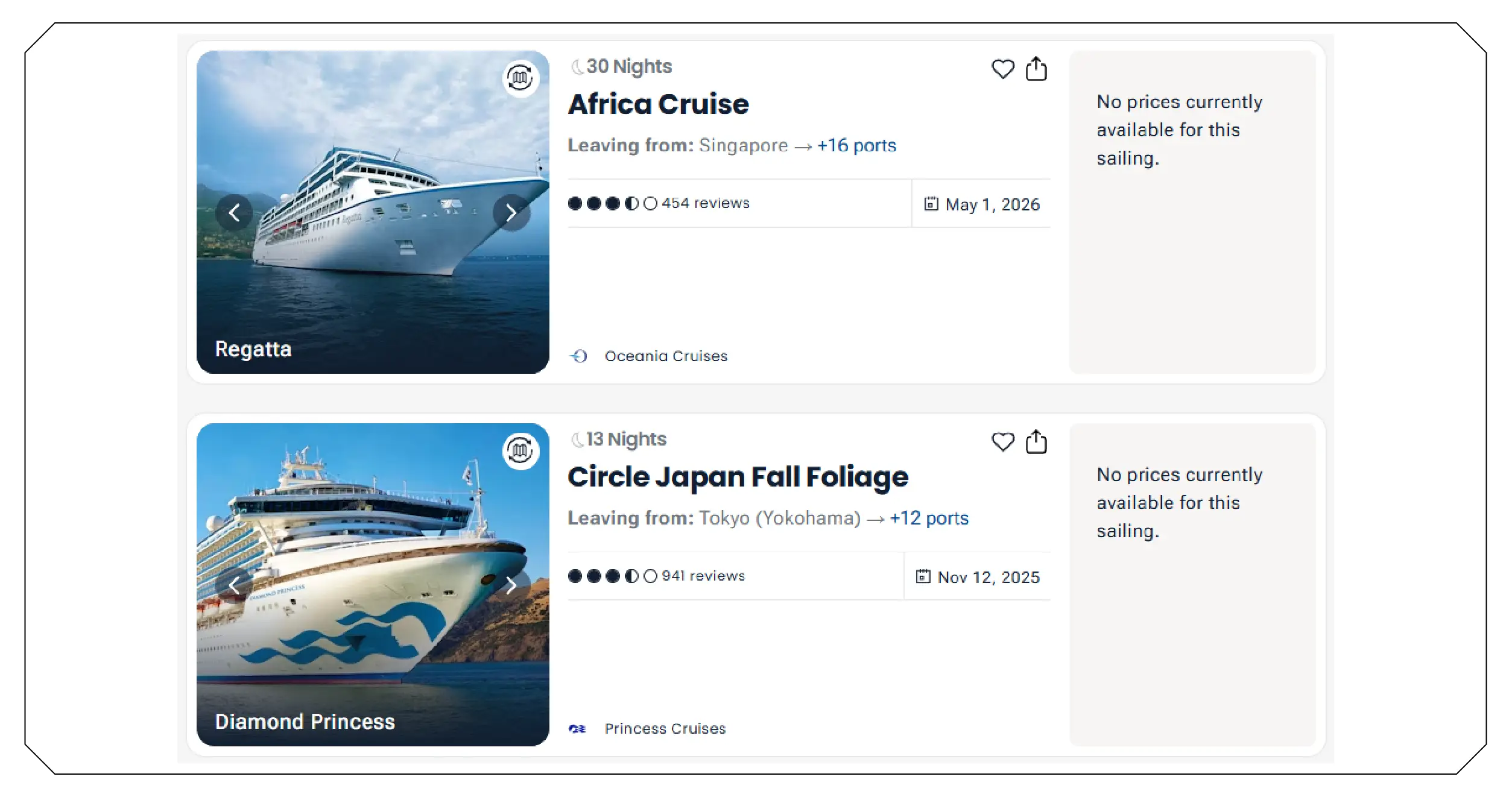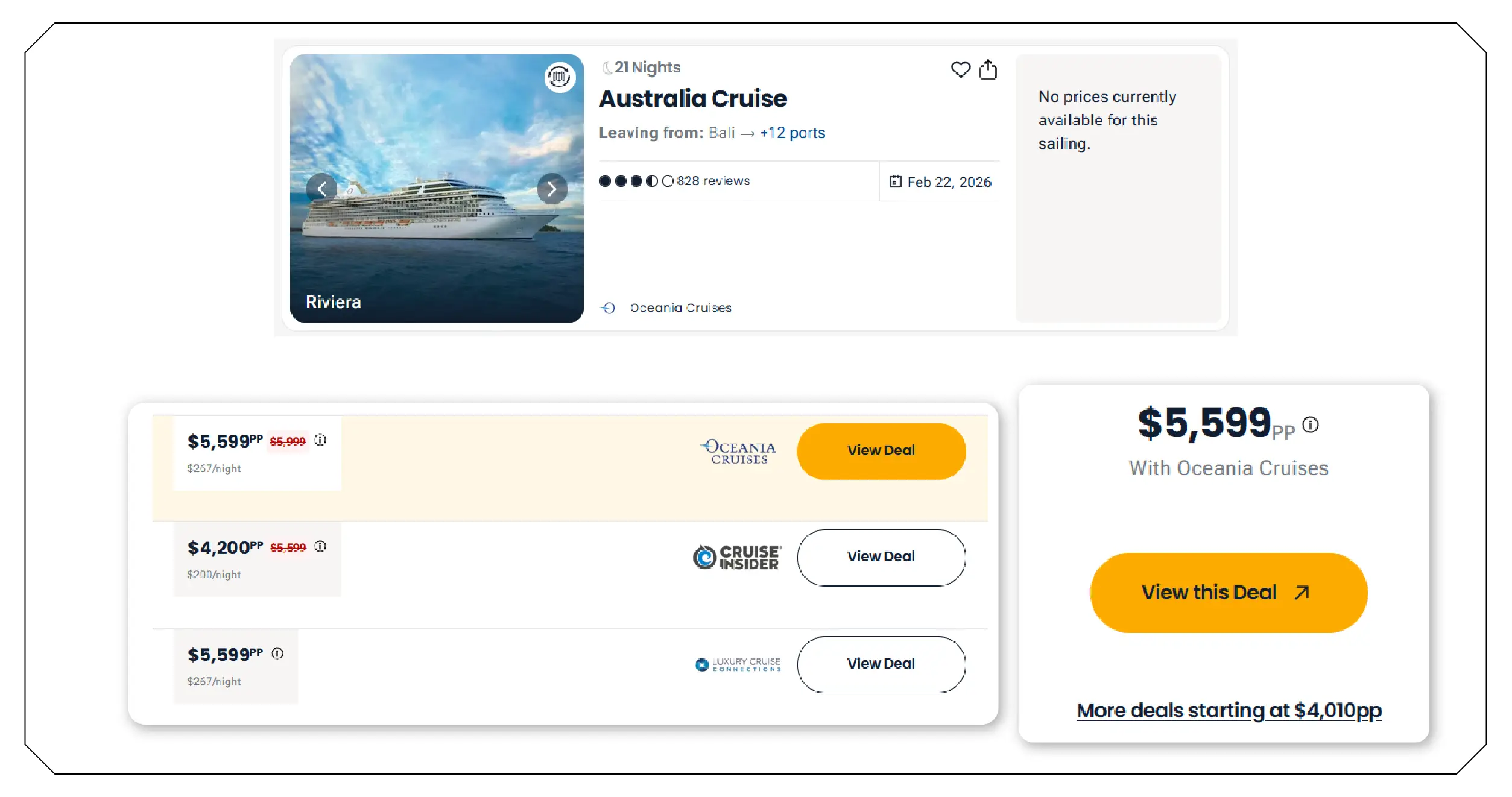How Can Businesses Scrape Cruise Lines Personalized Packages via API to Offer Tailored Travel Deals?

Introduction
The cruise industry has undergone significant evolution in recent years, with travelers increasingly seeking highly personalized and flexible experiences. In this competitive landscape, businesses that can Scrape Cruise Lines Personalized Packages via API gain a substantial advantage by accessing structured data on itineraries, pricing, and customer preferences. With the ability to analyze vast amounts of information efficiently, travel companies can offer tailored packages that resonate with individual travelers, optimize their revenue streams, and stay ahead in the ever-changing travel market.
Leveraging Cruise & Ferry Data Scraping Services enables businesses to collect comprehensive datasets from multiple cruise operators, integrating details such as departure ports, routes, onboard amenities, and promotional offers. By combining this information with advanced analytics, travel planners can make data-driven decisions that enhance both customer satisfaction and operational efficiency.
Furthermore, platforms that allow businesses to Extract Cruise Data for Personalized Packages via API ensure seamless access to real-time information. This approach eliminates the need for manual data collection, reduces errors, and accelerates decision-making processes. With automated pipelines, travel companies can monitor new offers, identify emerging trends, and respond quickly to market changes.
The Importance of Cruise Data in Personalization

Modern travelers expect more than standard packages—they want experiences tailored to their preferences. Personalized offerings, such as themed cruises, flexible itineraries, or exclusive onboard activities, are driving higher engagement and customer loyalty. By utilizing Travel Scraping API Services, companies can capture detailed booking and preference data to understand traveler behavior.
Analyzing historical booking patterns and real-time inquiries helps businesses identify which routes, cabin types, and amenities are most popular. Real-time insights into consumer demand allow operators to adjust pricing, offer targeted promotions, and design unique packages that meet the expectations of different customer segments. In addition, data-driven insights enable travel agencies to forecast seasonal trends, optimize inventory, and maximize occupancy rates.
How Real-Time Data Enhances Cruise Deals?
The ability to implement Real-time cruise deal scraping for customized offers transforms the way travel companies interact with their customers. Real-time scraping ensures that businesses have access to the latest promotions, last-minute deals, and itinerary changes, which can then be presented as personalized offers. This immediacy enhances conversion rates, improves the customer experience, and enables operators to stay competitive in a market where travel decisions are becoming increasingly time-sensitive.
Moreover, real-time monitoring helps identify demand fluctuations across different routes and cabin classes. Businesses can leverage this intelligence to implement dynamic pricing strategies, optimize onboard resources, and create value-added packages tailored to traveler segments. By combining automated scraping with predictive analytics, travel companies can anticipate trends before they fully emerge, giving them a strategic advantage.
Building Comprehensive Datasets

A robust Global Cruise Route Dataset forms the backbone of any personalized travel offering. Collecting route information across multiple cruise operators allows businesses to compare offerings, identify unique selling points, and develop packages that cater to niche traveler preferences. Structured datasets include details such as departure dates, ports of call, duration, onboard services, and excursion options, providing a comprehensive view of the cruise market.
Integrating customer reviews, ratings, and booking histories into these datasets enhances the understanding of traveler preferences. For instance, insights into preferred cabin types, popular destinations, or favored onboard activities allow operators to create tailored packages that match actual demand rather than assumptions. The combination of operational and customer data forms a foundation for delivering truly personalized experiences.
Analyzing Booking Trends
To maximize profitability and customer satisfaction, travel companies must analyze cruise booking trends via travel scraping API. By studying historical and real-time booking data, businesses can identify seasonal peaks, emerging travel hotspots, and shifts in customer behavior. These insights allow for proactive planning, ensuring that itineraries, cabins, and onboard services are aligned with traveler demand.
Trend analysis also facilitates the development of targeted marketing campaigns. For example, if data shows a rise in bookings for Mediterranean cruises among young couples, operators can promote romantic packages, excursions, or onboard experiences tailored to this demographic. Similarly, insights into family travel patterns can inform the creation of kid-friendly activities, family cabins, or bundled offers. Data-driven trend analysis ensures that personalized packages are relevant, timely, and appealing.
Enhancing Pricing Strategies
Cruise Pricing Intelligence is another critical application of data scraping. Understanding competitors’ pricing, seasonal fluctuations, and customer willingness to pay allows businesses to design dynamic pricing strategies that maximize revenue. With access to competitor fare data and promotional offers, operators can adjust their own pricing in real time to remain competitive while ensuring profitability.
Additionally, analyzing pricing trends helps identify opportunities for bundled offers, loyalty programs, or upselling premium services. For example, suppose data indicates a strong demand for suites with balcony cabins. In that case, travel companies can offer value-added experiences, such as exclusive excursions or onboard amenities, to increase the average revenue per booking. Pricing intelligence derived from structured data ensures a balance between competitiveness and profitability.
Understanding Customer Preferences
A critical component of personalization is the ability to Web Scrape cruise customer data travel packages. This includes collecting insights on preferred destinations, cabin types, onboard activities, and dining preferences. Structured analysis of this data allows operators to segment travelers into meaningful categories, such as families, couples, solo travelers, or adventure seekers.
Segmentation enables travel companies to design packages that match specific expectations. For example, adventure-focused travelers may receive offers for cruises with shore excursions, water sports, or cultural experiences. At the same time, luxury seekers are targeted with high-end suites, gourmet dining, and exclusive events. The ability to deliver personalized experiences directly impacts customer satisfaction, loyalty, and repeat bookings.
Benefits of API-Based Scraping
Automating data collection through APIs offers several advantages. APIs provide structured, reliable, and real-time access to cruise itineraries, pricing, availability, and customer reviews. By leveraging Travel Scraping API Services, travel companies can eliminate the manual effort associated with traditional scraping methods and ensure that their datasets are always current.
Additionally, API-based approaches allow integration with internal systems such as CRM, booking engines, or marketing platforms. This integration ensures that insights derived from scraping are actionable, enabling immediate deployment of personalized packages, targeted promotions, and dynamic offers.
Use Cases for Personalized Packages
- Tailored Deals for Niche Segments – Create packages for honeymooners, adventure seekers, or luxury travelers based on collected data.
- Dynamic Pricing Strategies – Adjust fares in real time according to demand, competitor pricing, and seasonal trends.
- Enhanced Customer Engagement – Offer personalized recommendations via email, mobile apps, or travel portals.
- Operational Efficiency – Align onboard resources, excursions, and staff allocation with anticipated demand to ensure optimal utilization.
- Marketing Optimization – Design campaigns around traveler preferences, booking behavior, and trend forecasts.
These use cases demonstrate how data-driven approaches, supported by Cruise & Ferry Data Scraping Services, enable travel companies to optimize revenue while delivering exceptional customer experiences.
Overcoming Challenges in Cruise Data Collection
While the benefits are clear, cruise data scraping presents several challenges. Websites often feature dynamic content, anti-bot protections, or frequent updates that can render traditional scraping methods ineffective. Manual data collection is inefficient and prone to errors, especially when tracking multiple operators and thousands of itineraries.
API-based solutions mitigate these challenges by providing structured and reliable access to datasets. Extract Cruise Data for Personalized Packages via API ensures that travel companies receive accurate, up-to-date information without the operational overhead of manual scraping. Additionally, combining multiple data sources helps provide a comprehensive view of the market, enabling in-depth trend analysis and effective competitive monitoring.
How Travel Scrape Can Help You?
- Comprehensive Cruise Data Extraction – Collect structured information on itineraries, routes, pricing, cabins, and onboard amenities across multiple operators.
- Real-Time Deal Monitoring – Track promotions, last-minute offers, and seasonal trends to enable timely, personalized cruise packages.
- Customer Insight Collection – Gather reviews, ratings, and booking behavior to understand traveler preferences and improve segmentation.
- API Integration & Automation – Use Scrape Cruise Lines Personalized Packages via API for scalable, automated data collection and seamless system integration.
- Analytics & Reporting – Deliver actionable insights via dashboards and reports, helping businesses optimize pricing, packages, and marketing strategies.
Final Thoughts
In the modern travel landscape, businesses that leverage data effectively can gain a substantial competitive edge. The ability to offer personalized cruise deals via a travel scraping API allows companies to tailor their offerings, improve customer satisfaction, and boost revenue. Similarly, Scraping cruise itinerary and pricing data via API ensures that travel operators have access to current, structured datasets for informed decision-making.
By analyzing Cruise Industry Trends, travel companies can forecast demand, optimize pricing, and create packages that resonate with diverse traveler segments. Combining APIs, automated scraping tools, and predictive analytics forms a powerful approach to personalized cruise offerings, enabling businesses to thrive in a competitive, data-driven market.
Ready to elevate your travel business with cutting-edge data insights? Scrape Aggregated Travel Deals to identify competitive rates and optimize your revenue strategies efficiently. Discover emerging opportunities with tools to Scrape Travel Website Data, leveraging comprehensive data to forecast market shifts and enhance your service offerings. Scrape Travel Mobile App to stay ahead of competitors, gaining instant insights into bookings, promotions, and customer behavior across multiple platforms. Get in touch with Travel Scrape today to explore how our end-to-end data solutions can uncover new revenue streams, enhance your offerings, and strengthen your competitive edge in the travel market.